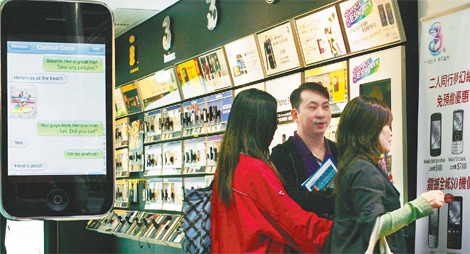Top Biz News
Mainlanders visit Hong Kong for iPhones
By Guo Jiaxue (China Daily)
Updated: 2009-12-28 08:09
 |
Large Medium Small |
|
Three mainland tourists study prices of iPhones at a cell phone shop in Causeway Bay, Hong Kong. Some Chinese mainlanders prefer to buy their iPhones in the special administrative region for a lower price and more features. [China Daily] |
A man in a gray suit, a cell phone in one hand and a large black suitcase in the other, entered an electronics shop in Times Square, a large shopping mall in Hong Kong.
He headed directly for Apple's iPhone counter.
Within a minute, he had checked the prices on the tags and made a decision to buy an iPhone 32GB.
That is a scene often replayed in electronics shops in Hong Kong.
IPhones were released in the Special Administrative Region in July 2008. Since then, tens of thousands of the mobile devices made by US-based Apple Inc have been sold to Chinese mainlanders.
Even though the iPhones were officially introduced by China Unicom on the Chinese mainland on Oct 30, 2009, mainland purchasers continue to snap up iPhones in Hong Kong.
Cost advantages
The biggest advantage to traveling to Hong Kong is the price. iPhones cost about 20 percent less there.
The popular smartphone has been on the Hong Kong market for more than a year, so Hong Kong retailers also won early status as major clients of Apple, which came with main sourcing channels and discounted prices.
The iPhones being distributed by Unicom on the mainland sell for 4,999 yuan to 6,999 yuan - about 1,000 yuan more than the price in Hong Kong.
"About 70 percent of our customers buying iPhones are from the mainland," said Maxwell Leung, a sales staff member at Fortress, one of the two larger electronics retailers in Hong Kong.
Sun Changquan, an Apple products fan living in Beijing, said he asked a friend to bring him an iPhone from Hong Kong in August, 2009.
He said he has loved the idea of the iPhone since it was introduced to the US market in 2007, but he waited until a third-generation (3G) iPhone was released in Hong Kong.
Before China Unicom introduced the iPhone to the Chinese mainland, the phones were linked to the US-based AT&T network, so they could not use networks provided by mainland operators.
They had to be "cracked" for use on the mainland, which might cause some negative effects on the phone's operation. The possible problems include a decline in voice quality, difficulty obtaining timely system upgrades, reduced battery life and cumbersome software installation.
|
||||
In addition, the Chinese-language system installed in Hong Kong iPhones was attractive to Chinese consumers.
After China Unicom released iPhone, it blocked the WiFi (wireless Internet) connection. So if a consumer buys a China Unicom iPhone, he still cannot enjoy the wireless features, but Hong Kong iPhones can offer the service.














